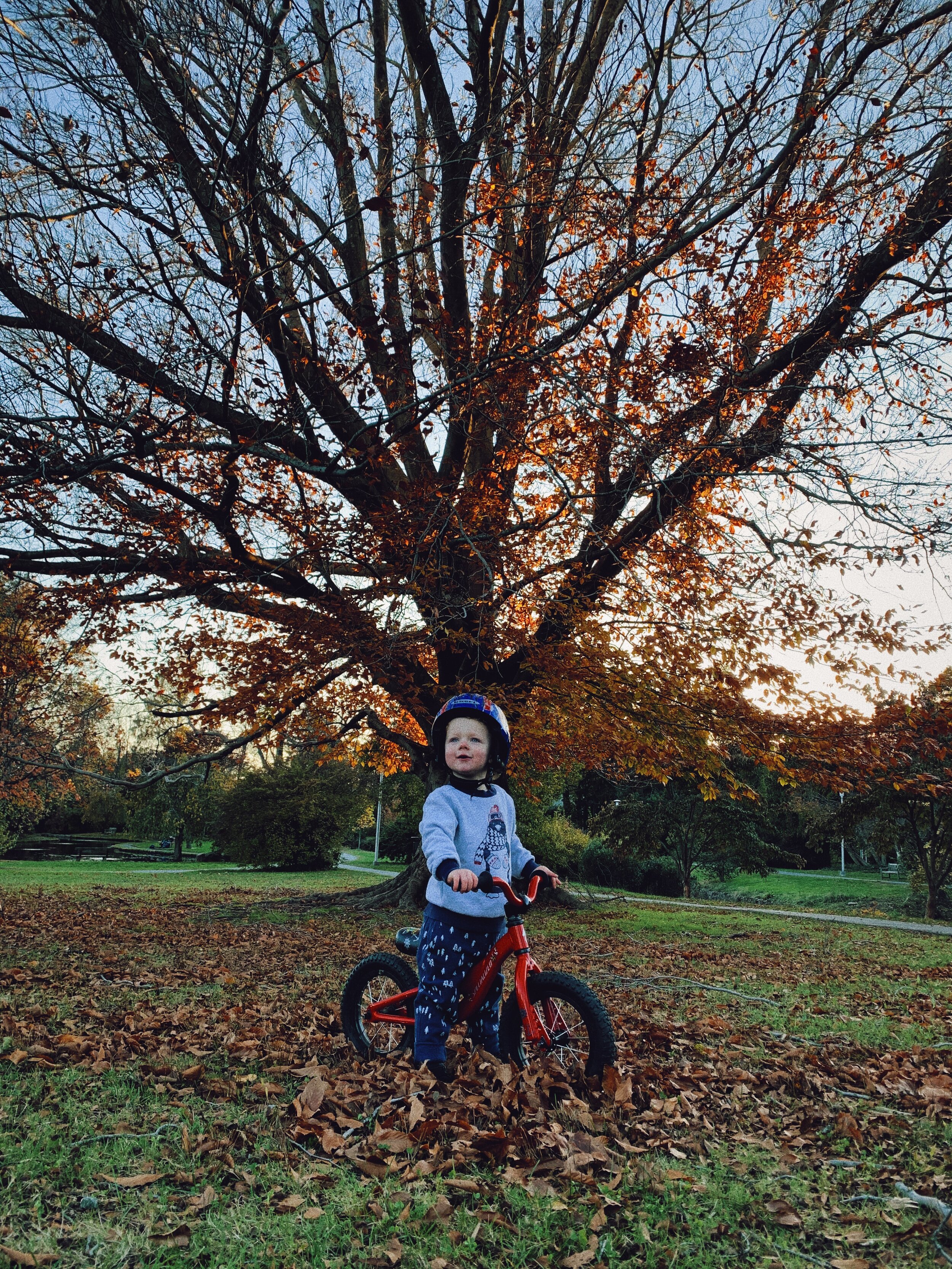What A 2-Year Old Can Teach Us About Triathlon
What I've learned since having kids (beyond juggling a million and one things at once) is that you learn as much from them as they do from you. In my experience, really paying attention to my children–and in particular my 2-year old–has taught me some valuable lessons when it comes to triathlon training. Yeah, you heard me right.
Before I expand any further, I want to introduce you to my beloved son Max. Just like any 2-year old, he has more energy than a Duracell bunny on speed. He also likes to ride his red balance bike, ferociously attacking each path and bombing down every hill he comes across. Obvious bias and lack-of-pedals aside, he's a remarkably talented cyclist.
When I'm not sprinting after him like a mad man, I love to observe his attitude and behavior both on and off the bike. I am going to try and whittle down the main observations in this article and I hope these points will help you become an even better triathlete, as they have done for me.
So without further ado, here's how a 2-year old approaches triathlon training...
Be in the moment
When Max is on the bike, he's on the bike. I'm not a mind-reader so I have no clue what's going on in his head but it seems to me he thinks of nothing else than the present moment. That might be the focused churning of his feet across the ground or the unadulterated joy of whizzing down a hill. Whatever he's doing at the time, his attention is undivided.
In my own triathlon training and racing experience, the floodgates of random thoughts and emotions spew open and this drowns out this all-so-important state of flow one benefits from being present in any given moment.
Focus your attention on whatever is happening right now.
This is easier said than done but try and switch off those incoming thoughts that criss-cross your mind during your training and racing. Instead, focus your attention on whatever is happening right now. I find that focusing on my breath is a good way to keep my mind decluttered. Give it a shot next time you head out for a swim/bike/run. Like anything in life, it takes practice so don't leave this until race day!
Go by feel
Like most triathletes, I've been victim to data overload. Pace, heart-rate and power are all invaluable insights; there's no denying that. But when you're a 2-year old, you don't have any of that information and even if you did, you wouldn't give a monkeys quite frankly. Instead, you go by feel and nothing else.
Allow me to expand. You see, when Max is feeling good, he pushes harder on the bike and as a result, he goes faster. On the flip side, when he starts to tire, he eases up or stops completely. Simple as that.
If you want to apply this to triathlon, it's really quite simple. Use the RPE (Rate of Perceived Exertion) scale to gauge your intensity at any given time. I like to use a 1-10 scale whereby 1 is very, very light activity with minimal effort and 10 is maximal exertion (aka "I want to die").
For all of my coached athletes, I prescribe a number of different workouts that all go by feel and nothing else, especially during the base phase of the program. I believe this is incredibly important and often overlooked by athletes and coaches. It not only gives my athletes a better understanding of how their body reacts to a given training stress but it also prepares them for any unfortunate situation where their data-gathering gizmos cease to function. If you're a middle and/or long-distance triathlete, have you ever thought about what would happen on the bike leg if your power meter conked in or your heart-rate monitor is giving off false readings during the run section? If not, seriously consider including some "feel sessions" into your training schedule.
Fueling after your workout
My son had a voracious appetite, even without doing any exercise. Get him on the bike for an hour and the boy wolfs down plates of food as if this was his last meal on planet Earth.
Nutrition is the fourth discipline of triathlon and is often the one athletes discount the most (along with sleep and strengthening). I could indeed rabbit on for paragraphs on end about what you should and shouldn't do when it comes to nutrition but that's not the focus of this article. What I want to get across to you my dear chum is don't be afraid to eat. I've come across too many athletes who get their knickers in a twist because they're constantly monitoring their weight. As a result, they find themselves in a perpetual cycle of calorific deficiency even though they might not appear to be or feel like so. I can't stress enough how important it is to properly fuel-up after your workout. Beyond that, you should also aim to eat often and well during the rest of the day and include a rich mix of healthy foods into your diet.
This point deserves its own respective blog post which I hope to address in the near future. For now, here's the take-home message: be more like Max and eat a lot! Chances are, you're probably not eating enough right now.
Rest, rest and more rest
His philosophy–if you can call it that–is really quite simple: he bikes, he eats and he rests. That's it.
Much like nutrition, rest is absolutely vital but is often pushed aside in favor of another commitment or training workout. Max, however, doesn't take that approach. His philosophy–if you can call it that–is really quite simple: he bikes, he eats and he rests. That's it.
I understand that life often gets in the way and it's hard to squeeze in training at the best of times. But when you're tired, don't sacrifice rest/sleep in favor of another workout. It's just not worth it. So listen to your body and don't be afraid to rest.
Be happy
Every time Max steps onto his bike, his all face lights up. He loves it. True, he's not busting a gut doing VO2 max intervals on the indoor trainer (yet) but regardless of the situation, he always seems so happy on the bike.
It might come as no surprise that being happy and positively-minded will make you a better athlete. There's an abundance of scientific evidence as well as athlete's stories that proves this theory.
So will this shave several minutes of your swim or increase your FTP by 10 watts? Probably not. But the journey will be much more pleasurable, even when the going gets tough. On the flip side, a negative mindset will diminish your performance. So, start learning to control your inner voice and frame even the most arduous workout in a positive light. You'll be amazed what even a smile can do.
So there you have it. The 5 triathlon-specific learnings from a 2-year old who simply loves to ride his bike. I have no doubt that I will continue to learn and be inspired from Max as he grows older. If you have kids–regardless of their age–start to take note of their attitude when they engage in a sporting activity of any sorts. Your triathlon training and racing might take a turn for the best if you do.

